Khoury News
Coast to coast: 2025 Khoury grads reflect, celebrate, and look forward
From Boston to Silicon Valley, from the US capital to north of the border, Khoury graduates have traveled wildly different paths. And as they walk the stage, their aspirations for what comes next are just as diverse.
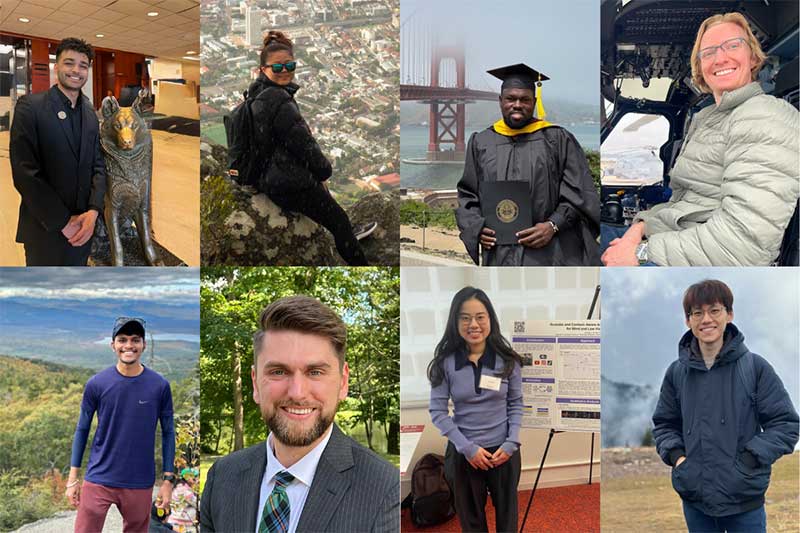
With another commencement season upon us, Khoury News met with students across Northeastern’s network of campuses to learn more about their unique experiences and future endeavors. To hear their stories, click on one of the linked names below, or simply read on.
- Akash Sancheti, Arlington
- Crystal Zhang, Boston
- Rohan Hughes, Oakland
- Benji Northrop, online
- Rahil Jhaveri, Portland
- David Treadwell, Seattle
- Lana Do, Silicon Valley
- Tsz Wai (David) Tam, Vancouver
Akash Sancheti, Arlington
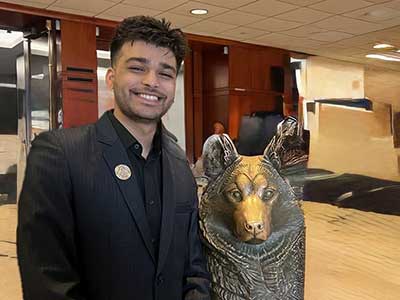
After working as a software engineer for a few years following his undergraduate studies in computer science, Akash Sancheti wanted to return to the classroom. And as a graduate student studying CS at Northeastern’s Arlington campus, his contributions have extended far beyond the classroom setting; he's been instrumental in building a sense of community there.
Sancheti founded the Arlington Explorers Society, a club that organizes group outings to areas in and around Washington, DC.
“Nobody knew the area, and people weren’t connecting with each other,” Sancheti said of the new campus.
The club has helped Arlington’s campus feel more like a home and enabled students to meet each other through hikes and cultural activities.
Sancheti is also a global recreation ambassador on the Arlington campus, planning events and collaborating with other Northeastern campuses to brainstorm and foster community. In this role, Sancheti said he has developed numerous skills that will help him professionally, namely collaboration.
When he wasn’t working as an ambassador, Sancheti served as a teaching assistant for “Fundamentals of Cloud Computing,” won Northeastern’s Network Student Award for Arlington’s campus, and has been nominated for Northeastern’s Outstanding Master’s Student Award in Community Impact.
After graduation, Sancheti plans to work as a teaching assistant at the Institute for Computational and Experimental Research in Mathematics at Brown University.
“My experience here at Khoury College has set me up for this role,” he said. “I've been a TA and I've built up communities. This summer, I'll be doing both.”
Crystal Zhang, Boston
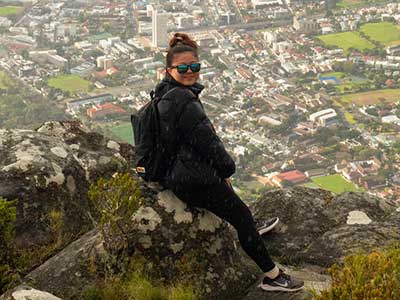
FULL STORY: Courses, clubs, co-ops, and travel: how Crystal Zhang made the most of her Northeastern journey
Although she didn’t see herself as a computer scientist in high school, after a software development internship, Crystal Zhang was inspired to give computer science a try at Northeastern. As a computer science and design major, she made the most of every resource she found.
She went on two Dialogue of Civilizations programs because she said she “always had this curiosity and dream to see the world.” On her first dialogue, Chang studied graphic design and typography in Switzerland, where she “leaned into that side of my degree.” Zhang’s second dialogue was in South Africa, where she worked with a local social enterprise, noting that she “made lifelong friends through this experience, and I’m excited to go back and visit them.”
On campus, Zhang became involved with Code4Community (C4C), a student group that develops software for nonprofits around Boston. While working with C4C, Zhang recruited designers, offered critiques, ran workshops, and mentored peers — even inspiring some, like Angeli Lu, to become designers.
Although Zhang remembers questioning her abilities and belonging in CS at the beginning of her Khoury journey, clubs and organizations like C4C and Rewriting the Code, an international nonprofit that empowers young women in tech through mentorship, helped her find her place and purpose. In the latter group, she went from mentor to mentee, relishing the opportunity to advise students navigating the same challenges she did.
READ: “I could be wholly myself”: Northeastern’s Rewriting the Code ambassadors share their stories
After graduation, Zhang hopes to work full time for Fidelity, where she completed two co-ops.
Rohan Hughes, Oakland
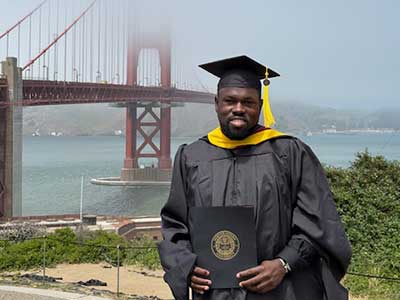
The English-major-to-CS-master's pipeline is rare, but Rohan Hughes makes it seem natural. After Hughes used his undergraduate degree to teach in the US and abroad, one of his friends suggested he take a computer science class — just to try it.
“Oh, I'm not a tech person,” Hughes recalled thinking. “That's for the tech geeks; that's not my thing.”
Slowly but surely, though, Hughes became interested in computer science and decided to apply to a full-time graduate program. He knew he wanted to go to California, and when he learned about Khoury College’s Align program, it seemed “perfect for someone like me who didn't have a tech background.”
Hughes said that Rasika Bhalerao has served as a great mentor to him. Bhalerao encouraged Hughes to take an AI foundations course and a research course, where he has studied topics he, as a Maryland native, cares about, like the impact of climate change on Chesapeake Bay. Hughes and his group also presented their research at a showcase, which Hughes found fulfilling.
“She's exactly the kind of professor that you hope for when you take a program like this," he said.
After forging connections with other students — including a friend from the same province in China where Hughes taught — and taking advantage of research opportunities, Hughes said that keeping an open mind was essential.
“My advice to other students is get involved, get engaged, make connections, meet people that way, whether it's just friends or networking. Just go to stuff!” he said.
Following graduation, Hughes hopes to stay in the Bay area and find a data-centric role.
Benji Northrop, online
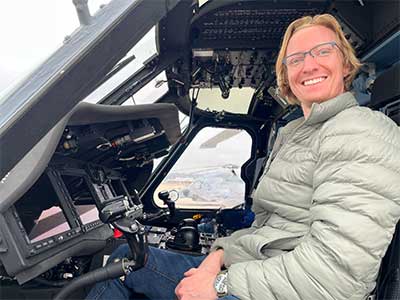
As a Navy helicopter pilot, Benji Northrop already had an extensive technical background. But he wanted a change of pace. He and his wife had always considered moving to Japan; however, as a pilot, “Flying internationally isn't very easy to do in the sense of job security and quality of life. Being home-based at an airline in the US is pretty good, but once you go overseas, it's a lot more difficult,” he said. Northrop thought a different technical path might open more doors and give him and his family a bit more freedom.
A friend noticed Northrop was good at coding on Excel and suggested he try coding or software engineering. Northrop did try, and eventually applied to the Align program, where he could be a computer science master's student while continuing to work full time.
Northrop explained that since he worked with lots of technical equipment like radars and sonars in the Navy, he was known as “the nerdy type of helicopter pilot." This helped his transition to computer science, where he took classes with professors who included Albert Lionelle and Bruce Maxwell. In Maxwell’s class, Northrop built a computer graphics system that takes photos of a 3D world by simulating a radar-based camera.
Northrop said this research “is what got me this [systems modeling and analysis] job. Having a working relationship with a professor for longer than just a semester was really beneficial. That mentorship and having a project that was in line with systems modeling really helped.”
Northrop, who defines his quality of life by the frequency of dinners had at home, is looking forward to graduation so he can spend more time with his family — as that is part of why he decided to pursue a career in tech to begin with.
Rahil Jhaveri, Portland
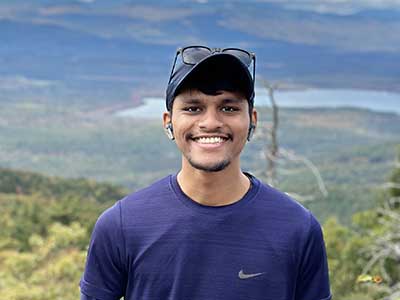
After completing his bachelor's degree in computer engineering and working in finance and security for a few years, Rahil Jignesh Jhaveri wanted to return to school. He’s stayed busy ever since — pursuing a master’s in data science, mentoring his peers, working as a TA, and even starting a cricket club at Portland’s campus.
He said working as a career peer advisor, which allows him to speak with nontechnical students hoping to transition to technical careers, has been a great experience.
“Our job is to help them navigate the process, and to share our experiences,” Jhaveri explained. “This has given me a sense of responsibility and shows that I have something else that I can do apart from my technical work.”
In addition to researching natural language processing systems and mentoring, Jhaveri has also enjoyed classic Northeastern events, such as attending the women's Beanpot in Boston, to round out his experience.
“I've never experienced an ice hockey game before, and that was a really cool game,” he said.
Jhaveri’s coursework will be over in June and after that, he is planning to take some much-needed time for relaxation and possibly continue in a full-time position at WEX, where he is currently an intern.
David Treadwell, Seattle
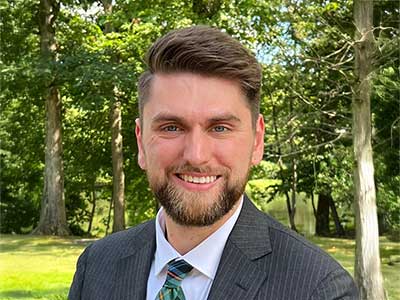
While working full time as a financial data analyst, David Treadwell realized that he liked working with Excel, specifically on the parts of Excel that required coding. After taking a few computer science classes on the side, he decided to pursue the field in a more concrete way by getting his master’s degree.
Treadwell said he picked Khoury College because “they seemed really focused on getting more than just theoretical knowledge, but [also] hands-on experience, and getting to work on a variety of projects.”
As a Khoury student, Treadwell did just that, participating in a hackathon where he focused on coding to improve forest fire preparedness for indigenous communities in British Columbia. After that, he worked for a nonprofit called Earth and Space Research “doing more work at the intersection of machine learning and environmental science,” such as analyzing changes in Arctic Sea ice.
Following his graduation, Treadwell plans to complete a research internship at the Pacific Northwest National Laboratory, then continue working for Earth and Space Research.
Before coming to Khoury College, he said he hadn’t realized “there's space in the environmental field for someone with a computer science background. My work at Khoury College inspired that.”
Lana Do, Silicon Valley
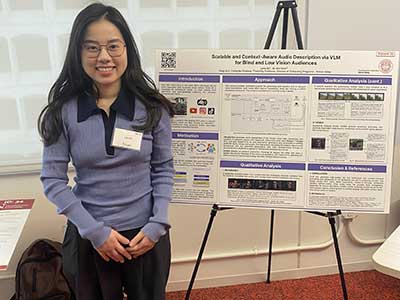
After getting a degree in industrial engineering at the University of Illinois Urbana-Champaign, computer science master's student Lana Do was ready for a change of climate. She moved to San Jose to work in manufacturing, but after being surrounded by tech in the Bay Area, she thought she might give computer science a try.
“I really liked the idea of being in the Align program and having people with different backgrounds bring different perspectives,” Do said.
After taking a few machine learning classes and serving as a research assistant for John Alexis Guerra Gómez on his responsible AI project, Do became interested in research. Gomez’s research looked at cases where AI could be harmful for humans, including discrimination.
“[We] published a paper and presented it at a small conference,” Do said. “It was the first time that I had written a paper and then presented it at a conference, so I thought that process was really interesting.”
Now, Do is working on another research project with Ilmi Yoon that aims to improve accessibility for blind and low-vision users by using AI to create audio descriptions for social media content. Do plans to continue working on this research over the summer and then to apply to PhD programs in the fall to pursue more research — not only for the academic aspect, but also to connect with other scholars.
“When I started doing research, I had more opportunities to talk to people about things that they were doing and ask for feedback,” she said, “and I found that experience very fun and rewarding. It has really opened me up.”
Tsz Wai (David) Tam, Vancouver
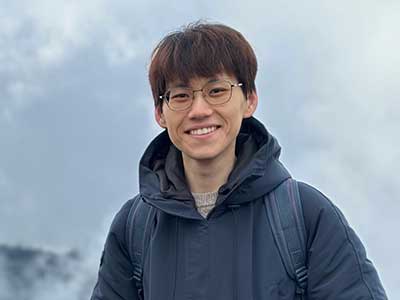
After studying language and literature at University in Hong Kong then teaching Chinese for years there, Tsz Wai Tam, who goes by David, wanted a change.
"There is a natural progression from teaching to software development,” Tam said. “I think they are both fundamentally about empowering people.”
Tam explained that as a software developer, he could create different tools to enlighten and empower people in a more scalable way than he could achieve as a teacher. He never completely gave up teaching, though; before long, he was working as a TA for both Lino Coria Mendoza’s “Object-Oriented Design” course, and Neda Changizi’s “Mobile Application Development” course, where he created assignments and hosted weekly office hours.
“Because I was a teacher, I know that it's hard to explain the concepts to the students, especially since we don't have computer science backgrounds,” Tam said. This is why he really admires the professors in Khoury’s Align program, he says – their ability to take complicated computer science concepts and break them down for those who have different educational backgrounds.
Tam was also part of the club, Husky Bytes, where he and a few team members worked to create software that helps airports detect movement and turn off lights when there’s no activity. The group also helped students create websites and prepare for graduation with networking tips.
Following his graduation, Tam will continue as a software developer at his current employer in Vancouver.
The Khoury Network: Be in the know
Subscribe now to our monthly newsletter for the latest stories and achievements of our students and faculty